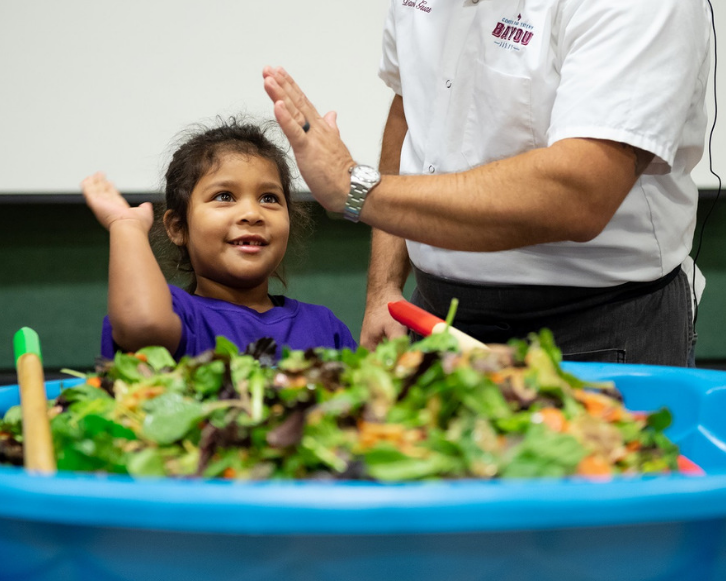Making Healthy Eating Fun for a Lifetime
Getting kids to eat their vegetables can be a challenge. But it doesn’t have to be. In fact, it can be a downright fun experience for everyone.
Each year, since 2011, Real Food for Kids has partnered with a local elementary school in Northern Virginia to put on our annual Food Day event. It’s like the food version of Earth Day, and a day when we encourage kids to make healthy choices in food and in movement.
This past October, on a sunny Friday morning, the students of Lynbrook Elementary spent the day running through food-themed obstacles courses, bending and twisting their way through yoga sessions and snacking on nutritious foods that they learned how to prepare.
Exposing kids in school settings to the power of delicious, healthful foods and to the joy of energetic physical activity creates a mindset that can carry them into adulthood.
Many of the schools where we hold our events serve students from low-income or immigrant households. For these kids, the healthy food choice isn’t always the easiest one. Their families struggle to afford healthy food. And their parents work, so finding time to cook balanced meals or play in safe spaces is a real challenge. For that reason, the foods our students eat or snack on at home is what their families can afford; however, those foods are often high in sugar, fat and salt. Food Day helps to remove some of the perception that more nutritious choices are out of reach by exposing kids to healthful foods and exercise.
The Challenge of Making School Meals Healthier
It’s always been our goal to work with school administrators and school boards to make school meals healthier. But that hasn’t been easy:
In the 1970s, many school cafeterias moved away from “scratch cooking” in favor of pre-packaged foods that only needed to be opened and served or warmed. Moving back to a “scratch cooking” environment can be costly. While some schools are making that move, others are looking at how to improve food quality within the system they have.
Many schools believe that kids don’t like and won’t eat salads or other healthy meals. But if we don’t offer them, when will they ever eat them? Salad bars, especially, have proven to be incredibly successful.
Few school systems see school meals as an integral part of the learning process, which limits opportunities for students to make the connection between healthful choices, academics, behavior and emotion.
Enter Food Day
With support from the Sampson Foundation, the Northern Virginia Health Foundation, and Innovation Health, we’ve put on food events that reach kids during their early years, when they’re forming taste buds, health habits and their likes and dislikes about different foods.
Our Food Day event is broken into two parts: an assembly-style program for our little kids — Head Start through second-graders — and a different kind of food “field day” for kids in third through sixth grade.
Our signature event is the “Big Salad” — which the kids love. With student helpers, celebrity Chef David Gaus makes a kiddie-pool-sized salad, using mini-garden tools, like a hoe and a rake, to mix it. The salad is then divided into smaller bowls and sent back to each classroom for the kids to taste their work. We also build a physical activity into the program to get kids up and moving.

Students at Lynbrook Elementary ran through food-themed obstacles courses as part of the Food Day event.
Many of our community partners participated in the event. Inova Health’s Healthy Plate Club demonstration showed the kids which foods to eat to power their bodies for academic and physical activity. Graduate students from George Washington University demonstrated how to use oranges and strawberries to create appealing flavored waters as an alternative to sweetened beverages. Food Corps created a hot rice-based breakfast cereal and led kids through a fun plant-inspired yoga exercise. In addition, we wanted the kids to become familiar with healthy food brands like KIND, who was there to help kids create a quick tasty snack, so that they could make healthier choices outside of school.
Leaving a lasting impression
We survey the students before and after each event to see if the information they receive changes their thoughts on healthy eating. And it turns out it does: we’ve seen kids say they better understand how to make healthier food options and that they’re excited to try new healthy foods.
Many schools hear about the success of our program and ask us to “come to them.” That drove us to create a Food Day toolkit so that any school could put on its own event — whether it has a healthy budget or a few dollars to spend.
We encourage schools to work with their community partners, including local businesses that can donate produce for the event. We also suggest thinking creatively to make the best use of whatever resources they have at hand, like gym and recreational equipment. That kind of thinking can save a lot of money.
We hope that exposing kids to just one Food Day event will spark fun conversations with family and friends about healthy eating and play.
And, maybe those conversations will turn into habits that last them a lifetime.

